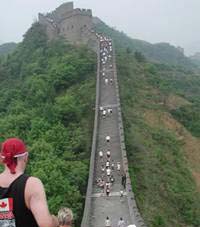Tianjin Major Event & FestivalsTianjin offers a variety of traditional Chinese Festivals held during the year. Some of these major events and festivals are listed below. For athletes or people who really want to get a workout and a dose of Chinese history and culture, may want to consider joining the Great Wall Marathon which is held annually in the city.
The Festival of the Bun Hills is a jolly festival takes place on the eighth day of the fourth moon, lasting four days. Religious rituals, traditional operas, colorful parades and traditional performances are all part of the celebrations. But the highlight is the raising of towering structures covered in bread buns in the city centers - youth scramble up them in an effort to collect the maximum number, as it is believed that the more buns you grab, the more good luck you will have in the coming year
The Tin Hau Festival takes place on the 23rd day of the new moon, and honors the young sea goddess Tin Hau ('Queen of Heaven'). Legend has it that she flew across stormy waters on a cloud to rescue her father and brothers from drowning at sea, and that she shared a special, mystical bond with the ocean. Numerous shrines all over China are dedicated to her, and she is believed to be the savior of all sailors and seamen; on this day, they offer prayers and perform rituals to Tin Hau, for protection in their sea-faring adventures in the coming year.
This huge festival honors the Chinese rose. Generally, it applauds the approach of summer. Regardless of the motives, it provides boundless opportunities for people to literally get out and smell the roses. An elaborate grand opening ceremony highlighted by a massive parade crammed with dancers, acrobats, floats and guys with painted faces, launches the weeklong festival. The crowning of Miss Rose, Chinese rose exhibits and evening boat tours along the Hai River are other highlights. The festival's dates fluctuate, but usually fall in or around mid-May.
Despite the rather ho-hum name, the Lantern Festival ranks only behind New Years for national popularity. Depending on the lunar calendar the fun and jocularity usually falls late January or early February - on the 15th day of the first lunar month. Participants wander the streets carrying elaborately decorated lanterns under the ancient belief they will shield off evil spirits hovering above. Many of the bars throughout the city host lantern decorating contests while diners feast on holiday traditional glutinous rice dumplings.
The first run covers 9 kilometers and includes steep ascents and descents. The second part of the race has participants running across rice fields and villages. The half marathon (5 kilometers) will see runners cross the Great Wall of China only once whereas, the full marathon (10 kilometers) will have runners circle the Wall twice. Seasoned athletes can complete the marathon in five-six hours. A word of caution: runners should go slowly along the Great Wall of China. Light colored clothes should be worn and all medical tests should be taken. There is an expert medical team all along the marathon who decide if athletes are fit for the race or not. The race ends with a celebration in Beijing on the following day of the race.
Located in the mountainous area in the northern of Tianjin, Jixian County, known as Yuyang in ancient times, has green mountains and clear rivers, with many historical sites. From the late September to early October, when the late autumn tourist season comes, the Yuyang Golden Autumn Mountain Tour Festival will be held here for one week. At that time, domestic and foreign tourists can join grand open-air gala celebrations held on the Huangyaguan Pass of the Great Wall, or participate in the competition of mounting the Great Wall. In the scenic Panshan Mountain, there are mountain or rock-climbing competitions, and high-altitude stunt and folk theatrics performances. Tourists can also join the tourist program of "becoming a mountain folk one day" by picking mountain fruits and visiting mountainous villagers.
Beitang is a famous fishing dock and an outlet to the sea with its rich seafood enjoying a high reputation in the Beijing-Tianjin area. In early October when the autumn tides rise in the Bohai Sea, it is a good season to catch fatty fish and prawns. The Sea Fair will be held in Beitang annually. Local fishermen celebrate the fishing harvest in their traditional ways, such as torch running, lighting lanterns on the water, setting-off basket lanterns, stilts, and dragon dancing. There is also a Beitang Finishing Fire Night sponsored by concerned cultural departments. Tourists can join the program of "being a fisher folk for one day". They can go fishing in the sea on a fishing boat, becoming a guest in a fisherman's family. They will be treated with different kinds of seafood.
Mazu, also known as Tianhou (Heavenly Mother), was a real woman who was born in 960 in Fujian's Meizhou Bay, near present-day Meizhou Island. At an early age she began to exhibit a religious disposition, and was thus given secret teachings by a Taoist priest. Using her magical powers, she often helped those in distress, in particular sailors and fishermen, and when she died she became known as the Goddess of the Sea. Mazu's main temple is located on Meizhou Island, where temple fairs are held in her honour every year. However, throughout China there are many other Mazu temples and Mazu temple fairs, the oldest such fair being held on Changdao Island in Shandong Province. The city of Tianjin, also on the coast, has its own Mazu Temple (called Tianhou Temple), and was once the location of the largest and grandest Mazu Temple Fair in all the land. The two most important days for Mazu worship - and therefore for holding temple fairs - are her birthday (the 23rd day of the third lunar month) and the day of her ascension to Heaven (the ninth day of the ninth lunar month). Of the two, her birthday is the occasion of the grandest celebration, thus Tianjin's Imperial Fair was at its most spectacular on that date every year. Festivities would last for several days, during which a statue of Mazu was carried solemnly on a parade about the city. The parade was accompanied by various folk performers, and when the entourage arrived at a specially prepared stage or received a calling card from an important person, it would immediately halt and the actors and actresses would perform a show on the spot. On that day Tianjin's Mazu Temple was filled with the deafening sounds of gongs and drums, mixed with the shouts and applauses of the spectators watching the various folk shows, which lasted from dawn till dusk. |

 Running
successfully for many years, The Great Wall Marathon is held
in May, where this annual event brings top-notch athletes world
over gather in Tianjin to compete in the five kilometers and
10 kilometers race. Organized by international athletic organizations,
this marathon is divided into two parts.
Running
successfully for many years, The Great Wall Marathon is held
in May, where this annual event brings top-notch athletes world
over gather in Tianjin to compete in the five kilometers and
10 kilometers race. Organized by international athletic organizations,
this marathon is divided into two parts. 
